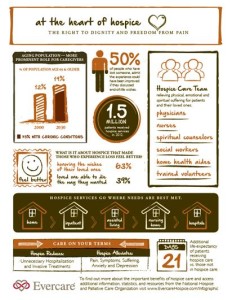 Five Unknown Facts about Hospice Care
Five Unknown Facts about Hospice Care
Guest article by Diana Pirez, RN
There is great confusion about the care delivered by hospice providers.
Many think hospice care means the patient is giving up the good fight or will die within a few days. But hospice care is not raising the white flag or resigning to the disease. Instead, it is choosing compassionate medical care based on the patient’s needs and wishes; it’s choosing increased quality of life and emotional support for you and your family.
Here are five things patients and families typically do not know about hospice before receiving care.
1. Hospice is a philosophy of care – not a place.
Hospice care can be provided wherever you call home, such as a personal residence, care facility, or even within a hospital should the patient need a higher level of care.
2. Hospice is care on the patient’s terms.
Hospice care is built around the patient, based on his or her wants and needs, which might include personal care, music therapy or other supplemental care. The care team does its best to help the patient live his/her life to the fullest while receiving hospice care.
3. An interdisciplinary team provides medical, emotional, and spiritual support.
Hospice care team members – including physicians, nurses, chaplains, and social workers, meet regularly with the patient and loved ones to make sure needs are being met.
Hospice care is choosing compassionate medical care based on the patient’s needs and wishes; it’s choosing increased quality of life and emotional support for you and your family.
4. Hospice care is focused on the patient as well as his/her loved ones.
From helping the family understand what the patient is experiencing to a friendly ear to listen, hospice care makes sure the patient’s loved ones have the care and support they need to live each day to the fullest.
5. People typically have a negative perception of hospice care until they experience it.
It is common for patients and families to underestimate the value hospice care can bring, often being hesitant to choose this type of care. But studies show, including one published in the Journal of the American Medical Association, that people who choose hospice care are happier with the care experience than those who did not choose hospice care.
Hospice is a compassionate, individualized care option available through Medicare, Medicaid, and most commercial insurers. One goal for people facing serious illness is to ensure they have hospice care as an option. Talk to your doctor about hospice care or contact a hospice provider in your area for more information.
Diana Pirez, RN has served as Chief Nursing Officer of Evercare Hospice & Palliative Care since 2012. She has more than 12 years of health care experience, including previous positions as a hospice executive director and hospice nurse. Today, Pirez is focused on continued clinical improvement to support quality care for Evercare patients and families. More information and resources about hospice can be found on this brochure (link to PDF document) for the Optum Palliative and Hospice Care, which was Evercare. UPDATED 8/3/2017









Thank you for this article. Most people have a misconception about Hospice. I know at some point in time that is coming soon if there is not a cure, I may need this. Little signs are starting to show of a decline in my loved one with Lewy Body Dementia. (Since around early 2011 her weight has gone from 181 to 103!)